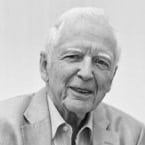
Harald zur Hausen, MD, DSc, a Fellow of the AACR Academy and a Nobel Prize-winning virologist whose work led to the development of the human papillomavirus (HPV) vaccine, died May 29, 2023, at the age of 87.
Dr. zur Hausen was born March 11, 1936, in Gelsenkirchen, Germany. He studied medicine at the Universities of Bonn, Hamburg, and Düsseldorf, earning his medical degree from the University of Düsseldorf in 1960.
In the early 1960s, zur Hausen moved to the United States to join the Virus Laboratories of the Children’s Hospital of Philadelphia. Over the course of his career, he held faculty positions in the United States and at several German universities and served as chairman and scientific director of the German Cancer Research Center.
In his early work, zur Hausen discovered that Burkitt lymphoma cells contained DNA from the Epstein-Barr virus, thus proving that viruses can persist in human tumor cells. He and his colleagues also elucidated connections between Epstein-Barr virus and nasopharyngeal carcinoma. He later developed simple methods to isolate human papillomaviruses that led to the discovery of HPV 6, a cause of genital warts.
In 1983, zur Hausen identified HPV 16 and HPV 18 DNA in cervical tumors. These two HPV strains have since been implicated in approximately 70 percent of cervical cancers, as well as several other cancer types. His discoveries led to the introduction of HPV vaccines and stand among the most important advances ever made in cancer prevention. In recognition of his pioneering work, he received the Nobel Prize in Physiology or Medicine in 2008.
Dr. zur Hausen joined the AACR in 1987 and was elected an Honorary member in 2010. He received the AACR Award for Lifetime Achievement in Cancer Research in 2008 and was elected to the inaugural class of Fellows of the AACR Academy in 2013.
He was also an elected member of the American Philosophical Society and the National Academy of Sciences. He served as president of the Organisation of the European Cancer Institutes, and as vice president of Leopoldina, the German Academy of Natural Sciences and Medicine.
Among many career awards, zur Hausen received the Robert Koch Prize in 1975, the Paul Ehrlich and Ludwig Darmstaedter Prize in 1994, the Ernst Jung Prize for Medicine in 1996, and the Charles Rodolphe Brupbacher Prize for Cancer Research in 1999.
He received the Prize of the Pan American Society for Clinical Virology in 2005 and the Gairdner Foundation International Award in 2008, and was named a Big Four of the Millennium by the German Society for Gynecology and Obstetrics in 2016. “Dr. zur Hausen’s discovery of the role of human papillomavirus in cervical cancer was a remarkable advance, leading to revolutionary progress against this deadly disease,” said Margaret Foti, PhD, MD (hc), chief executive officer of the AACR. “Countless lives have been saved as a result of his innovative science, dedication, and passion for cancer research.”
Leave your remembrance of Dr. zur Hausen below (limit 1,000 characters).
In 2008, I received a warm rejection letter from him. He was the editor in chief of the International Journal of Cancer. He indicated that the reason he rejected my manuscript was not because the quality of my manuscript. He said I should submit my manuscript to the Science journal where the original article I criticized was published. A few months later, he won the Nobel prize in physiology and medicine.
He is a pioneer in discovering the causal link between viral infectious and cancers. Nowadays, More and more viruses were found to be the causal agents of several cancers. In the mean time, we have not found any cancer was really caused by any gene mutations. We have been misled and fooled by some fake scientists for many years.
He is a real medical scientist. His discovery saved millions of lives.
Harald Zur Hausen was a figure of high scientific level and one of the few Nobel Prize winners in Medicine who had the good fortune to see the results of his studies implemented and applied in the course of his life. I had the privilege of establishing a personal and scientific dialogue with him and the honor of knowing him personally in 2010 when he was awarded with an honorary degree in Pharmacy at the University of Salerno, one of the many numerous academic awards collected in the course of his career.
Harald zur Hausen was one of the most impressive and incredible role models as a scientist and mentor I ever had. The world would desperately need more personalities like him again, especially in today 's challenging times. I will keep his honorable memory as long as I live.
Dr. Harald zur Hausen's contributions to the field of medical research and virology have been groundbreaking and immensely valuable. His pioneering work on the identification of human papillomavirus (HPV) as a leading cause of cervical cancer revolutionized our understanding of the disease and has had a profound impact on public health worldwide. Dr. zur Hausen's dedication and perseverance in pursuing his research on the role of infectious agents in cancer development have paved the way for new discoveries and insights into the complex interactions between viruses and human health. His work serves as a testament to the importance of rigorous scientific investigation and the potential of medical research to make a lasting impact on human well-being.